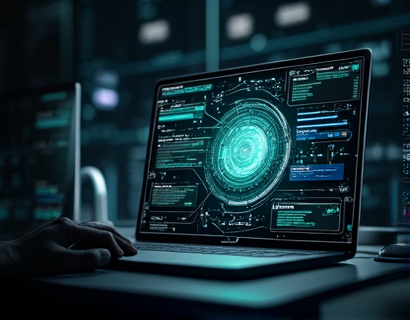Crypto-Powered AI Solutions for Enhanced Productivity: Exploring the Future of Digital Applications
The integration of cryptocurrency and artificial intelligence (AI) is ushering in a new era of digital applications that promise to revolutionize productivity in the modern workplace. This fusion of technologies is not just a novel concept but a practical solution that addresses some of the most pressing challenges faced by businesses and individuals alike. As we delve into this topic, we will explore how these cutting-edge digital applications are designed to streamline tasks, enhance efficiency, and redefine the way we approach work and innovation.
Understanding the Synergy Between Cryptocurrency and AI
To fully appreciate the potential of crypto-powered AI solutions, it's essential to understand the synergy between cryptocurrency and AI. Cryptocurrency, particularly those built on blockchain technology, offers a decentralized and secure way to conduct transactions and store value. This decentralization eliminates the need for intermediaries, reducing costs and increasing transparency. On the other hand, AI leverages vast amounts of data to learn, adapt, and perform tasks that traditionally required human intervention. When combined, these technologies create a powerful toolset for enhancing productivity and innovation.
Enhanced Security and Trust
One of the primary benefits of using cryptocurrency in AI applications is the enhanced security and trust it provides. Blockchain technology ensures that data transactions are immutable and tamper-proof, which is crucial for AI systems that rely on large datasets for training and operation. This security feature is particularly important in industries where data privacy and integrity are paramount, such as healthcare, finance, and supply chain management. By leveraging blockchain, AI applications can operate with a higher level of trust, reducing the risk of data breaches and ensuring compliance with regulatory standards.
Decentralized Data Marketplaces
Crypto-powered AI solutions are enabling the creation of decentralized data marketplaces, where data owners can monetize their data while maintaining control over it. These marketplaces use blockchain to facilitate secure and transparent data transactions, ensuring that data providers are fairly compensated. For AI systems, access to high-quality, diverse datasets is crucial for improving accuracy and performance. Decentralized data marketplaces address this need by providing a robust and secure source of data, thereby accelerating the development and deployment of advanced AI applications.
Case Study: Decentralized Data Platforms
A notable example of a decentralized data platform is DataPort, which uses blockchain to give users control over their data. DataPort allows individuals and organizations to securely share and monetize their data with AI service providers. This platform not only ensures data privacy and security but also creates a new economic model where data is a valuable asset. By integrating AI algorithms, DataPort can offer insights and analytics services, further enhancing the value of the data shared on the platform.
Efficient Task Automation
AI-powered digital applications are revolutionizing task automation, making it possible to streamline complex workflows and reduce manual effort. Crypto-powered AI solutions take this a step further by ensuring that these automated processes are secure, transparent, and incentivized. For instance, smart contracts can be used to automate business processes, executing tasks only when predefined conditions are met. This reduces the risk of errors and fraud, while also lowering operational costs.
Smart Contracts in Business Processes
Smart contracts are self-executing contracts with the terms of the agreement directly written into code. They run on blockchain networks, ensuring that all parties adhere to the agreed terms without the need for intermediaries. In the context of AI, smart contracts can automate a wide range of tasks, from supply chain logistics to financial transactions. For example, in supply chain management, smart contracts can track the movement of goods, verify authenticity, and trigger payments automatically when deliveries are confirmed. This not only speeds up processes but also enhances transparency and trust among all parties involved.
Personalized Productivity Tools
Crypto-powered AI applications are also transforming personal productivity tools, offering users tailored solutions that adapt to their specific needs and preferences. These tools can analyze user behavior, learn from patterns, and provide personalized recommendations to boost efficiency. The use of blockchain ensures that user data is securely stored and managed, giving users greater control over their information.
AI Assistants with Blockchain Integration
AI assistants, such as virtual assistants and chatbots, are becoming increasingly sophisticated with the integration of blockchain. These assistants can perform tasks like scheduling, reminders, and information retrieval, all while ensuring that user data is protected. For instance, a blockchain-based AI assistant can securely store and manage user preferences and history, providing a seamless and private experience. Additionally, these assistants can be incentivized through cryptocurrency rewards, encouraging users to engage more deeply with the platform and contribute valuable data for improving AI models.
Enhanced Collaboration and Remote Work
The shift towards remote work and distributed teams has highlighted the need for robust collaboration tools. Crypto-powered AI solutions are addressing this need by creating secure, decentralized platforms that facilitate seamless collaboration. These platforms use AI to enhance communication, project management, and file sharing, all while ensuring data security and privacy.
Decentralized Collaboration Platforms
Platforms like Nextcloud, which combines blockchain with AI, offer decentralized storage and collaboration tools. These platforms allow teams to store and share files securely, with version control and access management handled by smart contracts. AI-driven features, such as automated task assignments and real-time translation, further enhance the collaboration experience. By leveraging blockchain, these platforms ensure that all data transactions are transparent and immutable, building trust among team members and reducing the risk of data breaches.
Incentivized Participation and Token Economies
One of the most innovative aspects of crypto-powered AI solutions is the creation of token economies that incentivize participation and contribution. These token economies use cryptocurrency to reward users for contributing value to the network, whether through data sharing, task completion, or platform engagement. This approach not only motivates users but also aligns their interests with the success of the platform.
Tokenized Reward Systems
Tokenized reward systems are a key feature of many crypto-powered AI applications. For example, a platform might issue a native token that users earn by completing tasks or providing data. These tokens can be used to access premium features, participate in governance decisions, or even traded for other cryptocurrencies. This creates a self-sustaining ecosystem where users are actively engaged and motivated to contribute, leading to continuous improvement and innovation.
Challenges and Considerations
While the potential of crypto-powered AI solutions is vast, there are several challenges and considerations that need to be addressed. One of the primary concerns is the regulatory landscape, as the use of cryptocurrency and blockchain technology is still evolving and varies across different jurisdictions. Ensuring compliance with regulations while maintaining the decentralized nature of these solutions is a complex task. Additionally, the technical complexity of integrating blockchain and AI requires skilled developers and a deep understanding of both technologies.
Regulatory Compliance
Navigating the regulatory landscape is crucial for the adoption and success of crypto-powered AI solutions. Regulators are increasingly focusing on the intersection of cryptocurrency and AI, particularly in areas like data privacy, anti-money laundering (AML), and know-your-customer (KYC) requirements. Platforms must proactively engage with regulators to ensure compliance and build trust with users. This may involve implementing robust AML and KYC protocols, as well as designing systems that can adapt to changing regulatory standards.
Technical Integration
Integrating blockchain and AI technologies is technically challenging and requires a multidisciplinary approach. Developers need to have a solid understanding of both blockchain mechanics and AI algorithms to create seamless and efficient solutions. This often involves developing custom solutions that can handle the high computational demands of AI while maintaining the security and scalability of blockchain networks. Collaboration between tech experts, legal advisors, and industry stakeholders is essential to overcome these technical hurdles.
Future Prospects
The future of crypto-powered AI solutions is promising, with numerous applications across various industries. As technology continues to advance and regulatory frameworks evolve, we can expect to see more innovative and practical implementations. The combination of blockchain's transparency and security with AI's computational power will drive significant advancements in productivity, efficiency, and innovation.
Industry-Specific Applications
In the healthcare sector, crypto-powered AI can enhance patient data management, ensuring privacy and security while enabling seamless data sharing for research and treatment. In finance, these solutions can improve fraud detection, risk management, and compliance monitoring. In manufacturing, AI-driven supply chain management powered by blockchain can optimize inventory, reduce costs, and enhance traceability. The potential applications are vast, and the synergy between cryptocurrency and AI will continue to unlock new possibilities.
Conclusion
The fusion of cryptocurrency and AI is transforming the digital landscape, offering powerful tools for enhancing productivity and innovation. By leveraging the strengths of both technologies, we can create secure, efficient, and user-centric solutions that address the challenges of the modern workplace. As we move forward, it's essential to stay informed about the developments in this space and explore the opportunities that crypto-powered AI solutions present.










































